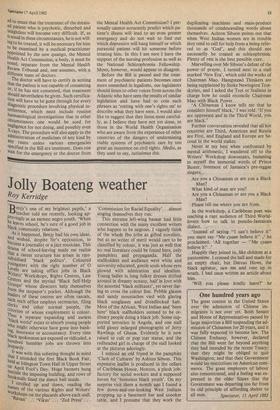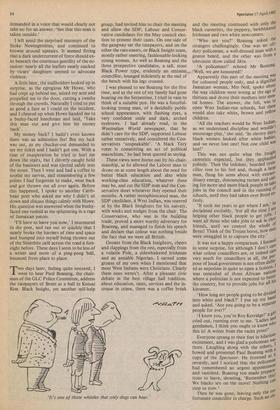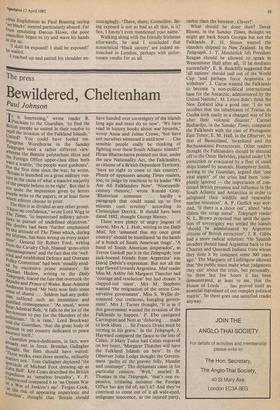Jolly Boateng weather
Roy Kerridge
enjy's one of my brightest pupils,' a teacher told me recently, looking ap- provingly at an earnest negro youth. 'When he leaves school, he's sure of a good job in black community relations.'
As it happened, Benjy had his own ideas, and wished, despite Sir's opposition, to b,cenme a journalist or a jazz musician. This Bran of school-leaving made me realise that a career structure has arisen in rate- subsidised 'black politics'. Coloured Youngsters with the right number of 0 Levels , are taking office jobs in Black Writers' Workshops, Rights Centres, Law Centres and the myriad 'Black Self-Help Groups' whose directors help themselves
leaders the taxpayer's pocket. Although the leaders of these centres are often rascals,
each such office employs secretaries, filing clerks and other normal people, the criterion of whose employment is colour. Thus a separate expanding and useless 'black world' exists to absorb young people
Who might otherwise have gone into bank- Ing, insurance or accountancy. Every time
hundred spokesmen are exposed or ridiculed, a nundred humbler jobs are thrown into Jeopardy. It was with this sobering thought in mind that I attended the first Black Book Fair, held at Islington Town Hall in Upper Street on April Fool's Day. Huge banners hung outside the imposing building, and rows of bookstalls lined the dance hall inside. I strolled up and down, reading the names of the various Rights and Writers' workshops on the placards above each stall.
`Ravan' 'Vikas' ... 'Zed Press' ... 'Commission for Racial Equality' . ..almost singing themselves they run.
This extreme left-wing bazaar had little connection with the many excellent writers who happen to be negroes. I vaguely think of the whole Ibo tribe as gifted novelists, but as no writer of merit would care to be classified by colour, it was just as well that no real literature could be found here, only pamphlets and propaganda. Half the stallholders and audience were white and university educated, gentle souls whose eyes glowed with admiration and idealism. Young ladies in long folksy dresses drifted around in dreamy ecstasy, half in love with the assorted 'black militants', yet never dar- ing to cross the colour line. Pebble glasses and sandy moustaches vied with glaring black sunglasses and dreadlocked hair. Most of the African, West Indian and 'born here' black stallholders seemed to be or- dinary people doing a black job. Some sup- ported terrorists in Angola, and one stall sold glossy enlarged photographs of Jerry Rawlings of Ghana. Evidently he is now raised to cult or pop star status, and the redheaded girl in charge of the stall looked at the pictures adoringly.
I noticed an old friend in the pamphlet 'Clash of Cultures' by Ashton Sibson. This expensive leaflet is produced in the cellars of Caribbean House, Hoxton, a plush job- factory for social workers and a supposed haven for 'homeless black youth'. On my surprise visit there a month ago I found a few down-and-out-looking West Indians propping up a basement bar and snooker table, and I presume that they work the duplicating machines and mass-produce thousands of condescending words about themselves. Ashton Sibson points out that when West Indian women are in trouble they tend to call for help from a being refer- red to as 'God', and this should not necessarily be treated as schizophrenia. Plenty of rest is the best possible cure.
Marvelling over Mr Sibson's defeat of the power of prayer, I turned next to a stall marked 'New Era', which sold the works of Chairman Mao. Hampstead Thinkers are being supplanted by Stoke Newington Trot- skyites, and I asked the Trot or Stalinist in charge how he could reconcile Chairman Mao with Black Power.
'A Chinaman I know tells me that he considers himself black,' I was told. 'If you are oppressed and in the Third World, you are black.'
Further conversation revealed that all hot countries are Third, American and Russia are First, and England and Europe are Se- cond in the world stakes.
Never at my best when confronted by mental arithmetic, I wandered off to the Writers' Workshop downstairs, humming to myself the immortal words of Prince Buster, foremost of Jamaica's pre-reggae singers: Are you a Chinaman or are you a Black Man?
What kind of man are you?
Are you a Chinaman or are you a Black Man?
Please tell me where you are from.
In the workshop, a Caribbean poet was teaching a rapt audience of Third World- lovers how to talk in pseudo-Jamaican dialect.
'Instead of saying "I can't believe it" you must say "Me cyaan believe it" ,' he proclaimed. 'All together — "Me cyaan believe it" .'
Happily they joined in, like children at a pantomime. I crossed the hall and made for an empty chair, but Darcus Howe, the black agitator, saw me and rose up in wrath. I had once written an article about him.
'Will you please kindly leave?' he demanded in a voice that would clearly not take no for an answer. 'See that this man is taken outside.'
I left amid the surprised murmurs of the Stoke Newingtonites, and continued to browse around upstairs. It seemed fitting that a dark undercurrent of force should ex- ist beneath the courteous gentility of the oc- casion: nearly all the leaflets neatly stacked by vicars' daughters seemed to advocate violence.
A little later, the stallholders looked up in surprise, as the egregious Mr Howe, who had crept up behind me, seized my arm and propelled me to the door, cutting a swathe through the crowds. Naturally I tried to put as good a face as I could on the incident, and I cheered up when Howe handed me to a bushy-faced henchman and said, 'Take this man out and give him his money back'.
My money back? I hadn't even known there was an admission fee! But my luck was out, as my chucker-out demanded to see my ticket and I hadn't got one. With a roar of exasperation he tried to hurl me down the stairs, but I cleverly caught hold of the banisters and was ejected safely into the street. Then I went and had a coffee to soothe my nerves, and remembering a few points I had forgotten to make, went back and got thrown out all over again. Before this happened, I spoke to another Carib- bean poet who asked me why I didn't sit down and discuss things calmly with Howe. His question was answered when the bushy- faced one rushed at me spluttering in a rage of Jamaican patois.
`I'll have to leave you now,' I murmured to the poet, and ran out so quickly that I nearly broke the barriers of time and space and bumped into myself being thrown out of the Sisterbite cafe across the road a fort- night before. These days I seem to be less of a writer and more of a ping-pong ball, bounced from place to place.
Two days later, feeling quite restored, I went to hear Paul Boateng, the chair- man of the GLC Police Committee, address the ratepayers of Brent at a hall in Kensal Rise. Black Insight, yet another self-help
group, had invited him to chair the meeting and allow the SDP, Labour and Conser- vative candidates for the May council elec- tion to present their cases. On one side of the gangway sat the ratepayers, and on the other the rate-eaters, or Black Insight team, mostly rather sneering, fashionable-looking young women. As well as Boateng and the three prospective candidates, a tall, stout Black Power type, evidently an eminent councillor, lounged indolently at the end of the bench with his legs crossed.
I was pleased to see Boateng for the first time, and as the rest of my family had gone boating on the Serpentine, I tried in vain to think of a suitable pun. He was a forceful- looking young man, of a decidedly public school appearance, with flashing eyes, a very confident smile and dark, arched eyebrows. I had already read, in the Westindian World newspaper, that he didn't care for the SDP, supported Labour rather tentatively, and considered the Con- servatives 'unspeakable'. 'A black Tory voter is committing an act of political masochism,' he had been quoted as saying.
These views were borne out by his chair- manship, as he allowed the Labour man to drone on at some length about the need for better black education and also white working-class education, whatever these may be, and cut the SDP man and the Con- servative short whenever they opened their mouths. A rather unsophisticated man, the SDP candidate, a West Indian, was sneered at by the Black Insighters for his naivety, with winks and nudges from the chair. The Conservative, who was in the building trade, proved a more worthy adversary for Boateng, and managed to finish his speech and declare that colour was nothing beside the fact that we were all British.
Groans from the Black Insighters, cheers and clappings from the rest, especially from a volatile Pole, a sidewhiskered Irishman and an amiable Nigerian. I earned some groans of my own when I mentioned that most West Indians were Christians. Clearly these ones weren't. After a pleasant civic debate in the best village hall tradition, about education, rates, services and the in- crease in crime, there was a coffee break `It's one of those whistles that only dogs can hear.' Spectator 17 April 1982 and the meeting continued with only the black careerists, the peppery, bewhiskered Irishman and two white newcomers.
`Who are you?' Boateng asked the strangers challengingly. One was an off- duty policeman, a well-dressed man with 3 goatee beard, and the other was from a television show called Skin.
'A policeman!' echoed Mr Boateng. `Well, we are honoured!' Apparently this part of the meeting was. for coloured people only, and a dignified Jamaican woman, Mrs Neil, spoke about the way children went wrong at the age of thirteen and drove their mothers into men- tal homes. The answer, she felt, was to open West Indian-run schools, but the would also take white, brown and yellow children.
`All the teachers would be West Indian, as we understand discipline and wouldn't encourage play,' she said. 'In slavery des' black women looked after white babies, and we never lost one! Not one child was lost!' This was not quite what the Insight careerists expected, but they applauded politely. Then the indolent, bearded col' cillor rose to his feet and, though a large man, flung his arms about with extraor- dinary energy, denouncing racism and call- ing for more and more black people to take, jobs in the council and in the running °' schools, until they had taken over Brent en- tirely. 'It took me years to get where I am,' he declaimed excitably, 'but all the time I air helping other black people to get jobs. ,' want all those who take jobs to ask in Oleic friends, until we control the whole 0' Brent! Think of the Trojan horse, how men were smuggled in to capture the city.' It was not a happy comparison. I listened in some surprise, for although I don't ace what colour councillors are, or indeed car very much for councillors at all, the Oh' pose of local government is not often defill; ed as nepotism in quite so open a fashion. was reminded of those African nations where a politician is not expected to bateer the country, but to provide jobs for all his kinsmen.
' 'clod
`How long are people going to be dwl into white and black?' I put up my 111°1 and asked. 'Are you going to be a separate
people for ever?' irl
'I know you, you're Roy Kerridge!' a $ A cried out, running over to me. 'Ladies an gentleinen, I think you ought to know who this is! A writer from the racist press!' Everyone sprang to their feet in hilarious s excitement, and I was glad a policeman Vial there. Laughing along with the others, bowed and presented Paul Boateng with a copy of the Spectator. He frowned at t severely, and I noticed that the policellw, had remembered an urgent appointive' and vanished. Boateng too made prePara; tions to leave, shouting, 'Remember this. We blacks are on the move! Nothing ea° stop us now.' Then he was gone, leaving only the ur:• fortunate councillor in charge. Such an 017
ious Englishman as Paul Boateng saying we blacks' seemed particularly absurd. Far from emulating Darcus Howe, the poor councillor began to try and wave his hands in the air.
'I shall be exposed! I shall be exposed!' he wailed.
I reached up and patted his shoulder en- couragingly. 'There, there, Councillor. Be- ing exposed is not as bad as all that, is it? See, I haven't even mentioned your name.'
Walking along with the friendly Irishman afterwards, he and I concluded that nonsensical 'black careers' are indeed en- trenched in London, perhaps with unfor- tunate results for us all.




































 Previous page
Previous page